Cover Story
Black Market III’s Scottie Blinn & Roxanne Coverdale: Soul Survivors
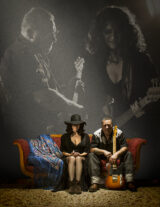
Scottie & Roxie. Photo by Nick Abadilla.
Black Market III is a roots-rock band based out of Lakeside, California, co-founded in 2011 by guitar slinger/vocalist Scott Blinn and bassist/vocalist Roxanne Coverdale. Beyond being married, Scottie and Roxy are deeply in love with each other, and deeply in love with music, so much so that it’s almost like a marriage among three people, the third being all the music in their life. And the music is so much more than just notes and chords for them. It’s most of all about love, passion, following your heart, and bringing joy and inspiration to anyone who’s willing to listen. And if you’re ever fortunate enough to witness a Black Market III show live, I’m confident you will immediately know exactly what I’m talking about.
In addition to their band, which has recorded four albums, and has been touring both the US and Europe consistently over the past 11 years, Scottie and Roxy have their own recording studio, Grease Punk Studios, their own homegrown outdoor concert venue called Hacienda on the Hill, and their own media company, Black Market III Media Management, where they dedicate themselves to helping promote other artists in all realms of the arts, not just music. They also make just about the best music videos I’ve ever seen… from anyone! And they do none of these things as if it was just their job. These two bring one hundred percent passion and dedication to everything they do. And to see them living their lives and their dreams in such a way is a great inspiration to all who know them.
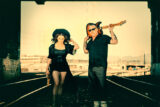
These two love being on the road. Photo by Josh Rose.
So, with that being said, let’s get this interview with Scottie and Roxy underway, and hopefully you will get to know them better and be as inspired by their life story as I am.
Eric: Scottie, if I’m not mistaken, I first met you sometime around 1992 or ’93, when you were playing guitar for Tomcat Courtney at Bodie’s in San Diego’s Gaslamp District: Brad Karow brought you over to Croce’s on your break and introduced us. I know a hell of a lot of what you did musically from that point on, but how about telling us how you first got into music, playing guitar, and ultimately how you ended up playing with Tomcat at that time?
Scott: I started playing guitar when I was 13. I saved my grass-cutting money to buy my first electric guitar. When I bought it, I was supposed to get two complimentary lessons. At the first lesson, the guy taught me “Tush” by ZZ Top. He disappeared after that lesson, but I learned one of the most important styles that would contribute to my style of playing!
At the time ZZ Top was popular on MTV with the Eliminator album. I wanted to hear more, so l bought The Best of ZZ Top, which had all of their earlier songs, and I liked that even more than Eliminator! They were the springboard for me into other Texas rockers like the Fabulous Thunderbirds and Stevie Ray Vaughan. From there I learned all about their influences, going back to the original blues music, and I thoroughly studied that music, the musicians, and the history of not only the music but the times and culture in which it was created.
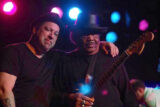
Scottie with dear friend Tomcat Courtney, who passed during the pandemic.
Fast forward to my college days at USD, where Tomcat happened to be playing in the student center, and that’s where we met and started a lifelong friendship. He started asking me to sit in at Bodie’s, down the street from Croce’s. Although only a block apart, Croce’s was “uptown” and Bodie’s was the epitome of “downtown”!
That’s when Brad (Tom’s drummer) brought me over to Croce’s to meet you. Tomcat, you, and all the guys I met through you all opened my eyes and ears. What an education! Tomcat and you were two of the biggest influences on me as a young blues musician, and that continues to this day.
Eric: Ah, you’re way too kind, Scottie, and I hope you know how deeply honored and grateful I am that you feel that way.
Scott: Next came starting and fronting my own band, the Mississippi Mudsharks in 1992. Tom Essa was on drums; Mike Jones, aka Sandalwood Haze (now with you!), was playing bass; and Donny Forsyth, who was the nephew of your bass player at that time, Ricky Andrade, who was playing second guitar.
Eric: Sounds like the circle will not be broken!

With San Diego Blues Fest promoter Michael Kinsman. Photo by Kelly Spoon.
I remember seeing the Mudsharks at one of your first gigs, or maybe it was your first, at your dad’s Shakey’s Pizza Parlor in Chula Vista or National City, and my recollection is that while I thought you guys had potential, you really weren’t quite there yet. But it seems that within a relatively short time after that the Mudsharks were all of a sudden a professional blues band and really started to make a name for themselves around San Diego, playing a residency gig at Croce’s every week for several years as well as the San Diego Blues Festival and some other pretty notable uptown venues. Could you take us through the journey from playing at your dad’s pizza parlor to playing these “real” gigs? Were there personnel changes in the band? Did your repertoire change at all?
Scott: Early on, the Mudsharks made an agreement that if we were going to be successful, we had to quit our day jobs. So, we did! From there we ended up playing seven nights a week for four years straight. Foreshadowing…this is when Roxanne and her friends would come see us a lot. Little did we know we’d end up together!
Then Donny got married and moved to Seattle, so we brought in Tom Mahon on piano, and he introduced us to even deeper blues. We kept hitting hard but started to bring more traditional aspects of blues into our music with Tom. We also started writing a lot of original material around this time as well.
Eric: I know you made several albums with the Mudsharks, so I’m curious as to exactly how many, and when you recorded your first album.
Scott: We recorded three albums with this first incarnation of the Mudsharks: Working for Nickels and Dimes in 1994, Traditional Heavy in 1996, and a live album in 1999, all of which led to national and international airplay as well as touring here and throughout Europe.
Eric: Could you tell us a little more specifically about how and when the Mudsharks started playing in Europe, where I know you developed a very loyal fan base that is largely still with you to this day?
Scott: Our friend and benefactor, Charlie Pendrell, first brought us to Europe on a business deal he had in 1996. We toured with a Cirque du Soleil-type troupe, playing convention halls throughout Germany, representing Cool Blue sunglasses for Zeiss, and doing a couple of public shows as well. We made some good connections from that tour, which really opened a lot of doors for us over there… We also ended up having a couple of number one CDs on the Crosscut Blues Charts in Germany, and that threw the door wide open for us.
Eric: So, what came next?
Scott: In 1999, I put together a new project called the Tiki Torchers with Dave Uosikkinen (the Hooters) on drums and Tim Butler on bass. After that I had Mississippi Mud with harp player Eric Von Herzen [Social Distortion and the Cadillac Tramps], and then the second incarnation of the Mudshartks with Eric on harp, Tom Essa on drums, and Mike Lars on bass. I kept it all moving forward through 2009, recording four more albums and doing extensive touring. And then it was time for a break.
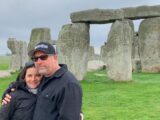
Oh, the places they’ve been! Scottie & Roxy at Stonehenge in 2019.
Eric: When did you and Roxanne start Black Market III, and how exactly did that come about?
Scott: It was in 2011, during my self-imposed break. Roxy and I started playing music together at home almost every night, and then we started dreaming of what kind of band we’d want, and what kind of eclectic music we could include, while still keeping our roots in the blues. We wanted it to stand out and be something truly different.
Eric: Well I’d say you definitely succeeded in that respect, especially with what the band’s been doing over this past year.
Hey Roxy, when Scottie first proposed starting a band with you playing bass, what was your initial reaction to that? And knowing that you hadn’t even played an instrument until shortly before he proposed this, how and when did you even start playing bass?
Roxy: I was all for it! But at first it was never supposed to be a band. Scott just started to teach me the basics of playing bass as a way for us to connect more, since we both love musi, and also as a means to unwind after a very stressful day at work. Then once he saw how quickly I picked it up he suggested that we start playing as a duo at some local cafe or outdoor bistro. But as you know, Scott doesn’t do anything small! So, we never even played the cafe or bistro! We went straight to forming the band, recording our first record, and touring Europe!
Eric: Let me backtrack for a moment here, Roxy, and ask you when and how you and Scottie first met? I know Scott mentioned it above in a rather general sense, but I’d love to hear your take on it.
Roxy: We met in the summer of 1993, at Blind Melons, which was a great blues club in Pacific Beach. At that time, I had a group of friends who would all go out to listen to music every weekend. One evening we happened to be walking down Mission Boulevard, headed toward Blind Melons, when I heard this loud ass guitar solo with tone I’d never heard before, and I said to my friends, “Let’s check this band out!” And the rest is history!
Eric: And when did you guys get married? Didn’t Dr. John marry you in Paris or something extraordinary like that?

Scottie & Roxie get married by Dr. John. Paris, 2004.
Scott: We were married July 3, 2004, by Dr. John! It’s a long story, but here’s basically what happened. Mississippi Mud was playing a festival in Antwerp, Belgium, that Dr. John was headlining. We went on right before him, and our bass player at that time, Greg Willis, told me that Dr. John was certified to officiate weddings. So in between our sets, when Dr. John and I were backstage, I asked him if he’d do it, and he told me to find a broom and “we’ll have us a fuckin’ weddin’!” So, Willis found a broom and held onto it through Dr. John’s entire set. After the show we went to the band catering room and had a Gris Gris wedding! Once Dr. John came out of his trance, he told us the significance of “jumping the broom,” which is jumping from your individual lives into your new married life together.
The next day we ran off to Paris and married each other just before midnight on the Eiffel Tower, which we did to honor Roxy’s mom and dad’s anniversary. That entire day was pretty crazy, but we’ll save that story for another time.
Then, once we came back to San Diego, we had a big family wedding, and I was honored to have you as my best man!
Eric: Brother, I don’t know how many weddings Dr. John has officiated, but yours was the only one where I was asked to be best man, and as you know, it was truly one of the greatest honors of my life, except when two different people asked if I was your father!
Scottie, what was yours and Roxy’s original vision for Black Market III in terms of the material you wanted to play, the audience you hoped to cultivate, and just the overall vibe that you imagined?
Scott: Initially we didn’t want to play in bars. We wanted to focus on doing shows in unique venues, where it would be more of a concert situation. We also wanted both our music and audience to crossover from the blues scene. Basically, we wanted to play whatever music we loved and have it reach as wide an audience as possible… and not be confined by whether or not it was blues.

Photo by Karo Achen.
We had some success with that early on, but then Roxy decided to call it a day with her corporate career to be a full-time professional musician, so we started booking as much as possible, which meant playing bar gigs in order to keep paying the bills. But this also enabled us to do a lot more touring, both in the US and Europe. In fact, next month, in September, we’ll be starting our 11th (my 20th) European tour.
Musically, we wanted to be a cross between all the original blues artists that we love so much, mixed in with Tom Waits, Social Distortion, Dead Weather, Tito and Tarantula, and many more, and at the same time to sound distinctly like us. We wanted our music to be more obscure and not pegged as one genre. We wanted there to be some familiarity to keep people engaged while also hoping they would be open to our more obscure side.
Eric: How about now taking us through the past 11 years of Black Market III—the highlights, the low points, and what’s kept you going all these years? Be sure to tell us about the years when you were living in your motor home, traversing the country playing music!
Scott: It’s really been about ninety-nine percent highlights. We’ve been fortunate enough to have done extensive touring in the both the States and Europe, including playing many great festivals throughout the years. We recorded four independently released CDs before signing with Rip Cat Records for our Dashboard Jesus CD and our newest to be released this year. We’ve continued to evolve in terms of both our sound and song writing, while broadening our concepts and appeal. While Black Market III began—and played for pretty much its first ten years as a trio—over this past year we expended the band to eight pieces with piano and organ, percussion, and a three-piece horn section for our home shows and new CD. And I hope it’s a hit so we can take ‘em all on tour!
Eric: Speaking of which, other than you and Roxy, who is in the current Black Market III line-up?
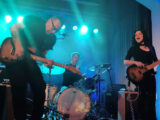
Black Market III, with Joe Hager on drums. East Germay, 2017. Photo by Wolfgang Heerman.
Scott: It’s Joey Hager on drums, Alan West on percussion, either Mark Boyce or Paul Cougill on organ and piano, Andy Geib on trombone, Nate Samuels on trumpet, and either Eddie Croft or Jonny Viau on saxophone.
And now getting back to the some more of the highlights of the past 11 years, one of the coolest things has been the extensive touring we’ve done in Europe, where we basically live over there for three or four months a year and completely immerse ourselves in their cultures. Through our music and touring in 12 different countries we’ve met the greatest friends, many of whom we now consider family to us, and it’s been a huge blessing in life.
Regarding our motor home, “Cousin Eddie,” which we bought it in 2017, we rented out our house in Lakeside and basically lived in it for three years until 2020. Those were some great times. We had total freedom and didn’t have to rely on staying in cheap motels where you worry about your gear getting stolen in the motel parking lot. We had good home-cooked meals in the RV kitchen, too!
We also own a recording studio, so we even took the studio mobile in the RV, where we recorded most of our last two CDs as well as CDs for several of our friends’ bands, while touring throughout the country. And we found some great locations for video shoots, too! But, most important, Roxy and I always loved spending all of our time together anyway, so the close quarters was never an issue.
A little taste of Black Market III.
A couple of recent blessings also came to us during the pandemic lock-downs. We wanted to keep our audience engaged, so we got creative in finding new ways to do that. To start, we made three new music videos, the first being the Beatles’ song “Let It Be,” which seemed appropriate for the tim; it featured many of our musician friends both here and in Europe. Next, we did a video of the Tom Petty song “Swingin’,” which is one our favorites, although one of Tom’s lesser-known songs. And, finally, we made a mini movie with a set we built ourselves while staying in the high desert with our percussionist Alan West. It’s based on David Bowie’s “The Man Who Sold the World,” and it’s a dark carnival theme with many of our friends playing parts, and us cast as the specter of the past band.
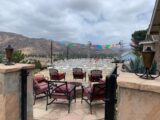
The Hacienda on the Hill, a concert venue that the couple built on their property.
After 11 years, we finally decided to make our initial concept a reality, and built our own unique venue to put on shows. It’s called “Hacienda on the Hill,” which is located on our property in Lakeside, surrounded by beautiful mountains and valleys. So far, we’ve had three amazing concerts here in the foothills of East County, and we’re looking forward to many more in the future.
Eric: Let’s talk guitar for just a moment, Scottie. How do you think your playing has changed or grown throughout the years, from your Mudshark days to now? Is your approach pretty much the same or has it changed in any significant way? Who are your main guitar influences, from early on to the present? I also knew that you were a loyal Stratocaster man back in the Mudsharks, and now you pretty much play only Telecasters. Was there a specific reason for that change and do you think that playing a Tele has affected your playing style or approach at all?
Scott: In the early Mudshark days we kept close to the roots and tradition of the blues. I learned early on, though, that playing blues means using your own voice, heart, guts, and soul to communicate. So, although we’d cover our favorite songs and stayed reverent to the original style of that song, we did it in our own unique way. I personally developed a style and tone that I can honestly say is me, even if I wear my influences on my sleeve. And my approach is still the same 30 years later. I’ve always looked at the guitar as another way to express my emotions and as my second voice. What’s changed is adding more different flavors and colors to the music. With the addition of so many musicians, both our band’s sound and my own playing have evolved from traditional blues to a harder-edged, darker sound. And now we’re adding a lot of Latin and early soul flavors, which is where we’re at with our upcoming CD.
The list of my influences is way too long! And it’s not just the playing, but the attitude and style of all those guitar players that inspires me. There’s obviously you and Tomcat Courtney as well as Freddie, BB, Albert King, T-Bone Walker, Albert Collins, Lightnin’ Hopkins, Hubert Sumlin, Billy Gibbons, Anson Funderburgh, Ronnie Earl, Jimmie and Stevie Vaughan, Jimi Hendrix, Jonny “Two Bags” Wickersham (Social Distortion), Joe Strummer, Marc Ribot (Tom Waits), Neil Young, Jimmy Page, Dave Gonzalez, David Gilmour, San Diego’s own Fred Kokaska, Miles Kenney, Joey Harris, and Jerry Raney. I know there are other important ones that I probably left out!
Iconic guitar headstock.
Early on I believed that the Stratocaster was the best guitar for playing blues and I bought my first Strat the day I graduated high school in 1987, which I still have! I played hollow-body guitars for a few years, but then I fell in love with a custom Telecaster from a local company called Iconic Guitars. I love mine so much that I inked an endorsement deal with them and actually took a job there as part of a team building custom guitars! Teles are pure, bare bones, raw sounding guitars, which is exactly me. I rarely play anything else now.
Eric: In response to all that, Scottie, I don’t even know where to begin to thank you for including me in that amazing list of your guitar influences, but I will say that knowing you think about me that way makes me feel that my life has had some real meaning, just about as much as anything else. Knowing that I had an impact on someone who plays as great as you do and is as respected as you mean the world to me.
I’d also like to offer my own take on how I think your playing has changed over the years since I first saw you in the Mudsharks. I think because of the nature of the material you’re playing with BMIII, which has different chord progressions than straight ahead blues, your playing has become more melodic and more of an integral, interwoven part of each song rather than just being about a guitar solo in the middle of the song, no matter how killer that guitar solo may be. And that’s something that is a real turn on to me musically these days, and I think you’re fantastic at it. However, one area where I don’t think your guitar playing has changed at all is that you still play with the same intensity, conviction, love, and passion that you’ve always had, and that shines through with every note I’ve ever heard you play, no matter where it was or how many people were in the audience!
And now, let’s get off all this guitar talk and get back to Roxy!
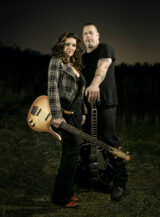
Photo by Nick Abadilla.
Roxy, if my memory serves me correctly, when you guys first started Black Market III, Scottie was singing around 98 percent of your songs, and you weren’t even singing that much harmony back then. But over the years playing together you started singing more and more, both lead vocals and harmonies on the songs Scott sings. Could you explain that process to us?
Roxy: I’ve always loved to sing, but at the start of the band I was just so focused on the bass. I started playing violin at a young age and truly loved it, and it felt like the bass was somewhat similar to that. So, it was a way for me to reconnect with that childhood love I had for the violin. And it also made more sense to have Scott singing most of the songs back then, based on the type of music we were playing. But I always knew I’d eventually sing, and now I love playing bass and singing equally.
Eric: And that is abundantly obvious from seeing you, whether you’re playing bass or singing. I’d say that with both you radiate a kind of genuine joy that is incredibly inspiring, almost hypnotic! And beyond singing, Roxy, I know that you’ve started writing songs recently and from the few that I’ve heard, I think they’re great! And I don’t mean great just in the sense of “good for you, I’m proud of you,” but great in the sense that when I heard ‘em, my immediate reaction was, “man, I wish I had written that song!
Roxy: Thank you so much for that Eric! It truly means a lot coming from someone whom I respect and admire as a songwriter, musician, and valued friend. I think I’ve always had a desire to write. I used to write song ideas—or more like line ideas—down on paper at a young age and, through life’s experiences, both the highs and the lows, I’ve used that process to help me get through some of the lows, especially more recently.
Eric: Earlier in this interview I asked you guys what your vision was for Black Market III when you first had the concept some 11 years ago. Now that you’ve been together for all these years, touring the US and Europe multiple times, and having recorded several albums, do you think things panned out the way you envisioned them, or has the band taken some unexpected twists and turns that even surprise you?
Roxy: As I previously mentioned, when we first started playing the vision was simply to do something together that we both loved. Without sounding cliché, music is life to us. I can’t imagine our relationship without it. Eleven years later, it’s become more of a mission to inspire people to follow their passion, bring levity into this chaotic time we’re currently all experiencing, and be messengers of hope.
Eric: Ah, that’s beautiful, Roxy. Without trying to tout our new album through your interview, your sentiments remind me of a song we wrote for it called “Soldier in the Army of Love,” and I know that you and Scottie are true soldiers in the army of love.
And, finally, what’s on the horizon for the future, especially this next year? I know that you are planning to return to Europe next month, and I’m thinking that you might be releasing a new album in support of that tour, so could you expound upon that for us?
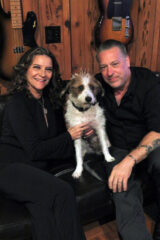
Scottie & Roxie with their sweet dog, John Henry. Photo by Dan Chusid.
Scott: Yep! We’re near completion on the new CD and have a 22 city European tour booked for this fall. The plan is to continue evolving with our music, spend even more time in the studio, book more cool shows at our private venue “Hacienda on the Hill,” and to keep digging deeper and growing as musicians.
Eric: That all sounds great. Since you’re near completion on your new album, do have you have a title for it yet?
Scott: It’s gonna be called Soul Survivor, after a new song that Roxy wrote for the album.
Eric: It’s a great song and a killer album title. You guys are soul survivors!
Well, I guess that about wraps it up then for now. Thank you for doing this. Aside from being two of mine and Alicia’s dearest lifelong friends, objectively speaking you are just about the hardest working, most dedicated and passionate individuals I know, and you deserve all the success that comes your way!
Black Market III Discography:
- Songs That Shake the Cage (2012)
- Black Roses (2013)
- Vanarchy Live (2014)
- Black Country (2016)
- Dashboard Jesus (2018)










